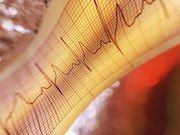
And evidence insufficient to recommend ECG screen for asymptomatic adults at intermediate or high risk
TUESDAY, June 12, 2018 (HealthDay News) — The U.S. Preventive Services Task Force (USPSTF) recommends against screening with resting or exercise electrocardiography (ECG) to prevent cardiovascular disease (CVD) events in low-risk asymptomatic adults. This final recommendation statement has been published in the June 12 issue of the Journal of the American Medical Association.
To inform the USPSTF, Daniel E. Jonas, M.D., M.P.H., from the University of North Carolina at Chapel Hill Evidence-Based Practice Center, and colleagues conducted a systematic review of the evidence from 16 studies with 77,140 participants on screening asymptomatic adults for CVD risk using ECG.
The researchers found that it is very unlikely that the information from resting or exercise ECG would result in a change in a patient’s risk category that would lead to a change in treatment or improve health outcomes for asymptomatic adults at low risk for CVD events. Screening with resting or exercise ECG is associated with possible harms, specifically the potential adverse effects of subsequent invasive testing. Based on these findings, the USPSTF recommends against resting or exercise ECG to prevent CVD events in asymptomatic adults (D recommendation). For asymptomatic adults at intermediate or high risk of CVD events, the evidence is insufficient to assess the balance of benefits and harms of screening.
“There is not enough evidence for those who might benefit the most — people at higher risk for CVD — to say if adding ECG screening helps prevent heart attack and stroke,” Task Force member Michael J. Barry, M.D., said in a statement. “Clinicians should continue to use traditional risk factors to assess CVD risk and guide treatment for these patients until more evidence is available.”
Evidence Review
Final Recommendation Statement
Editorial
Copyright © 2018 HealthDay. All rights reserved.







